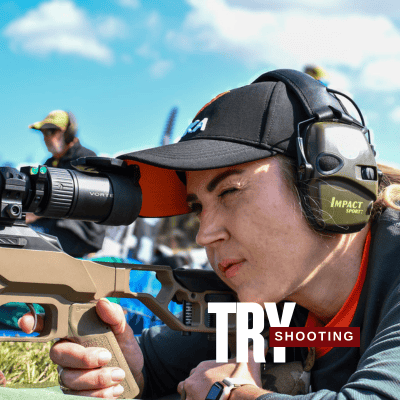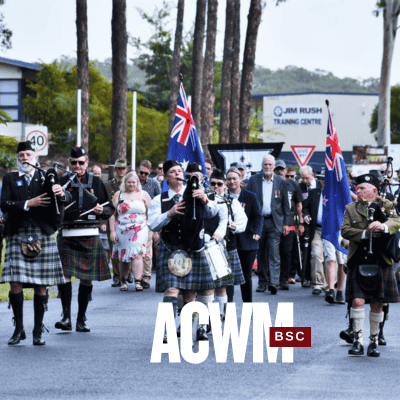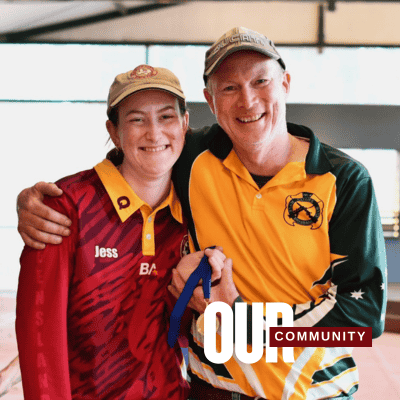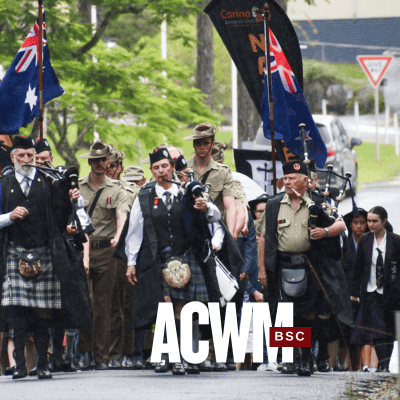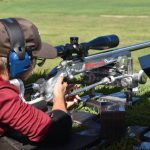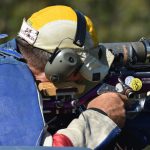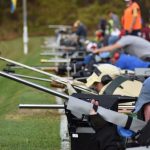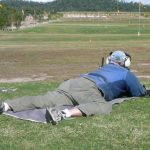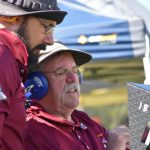LANGUAGE ON THE RANGE
A Short A to Z about language you will hear on the range
Action – is an operating mechanism that presents the cartridge for firing, for example bolt action or lever action
Aiming mark – the black disk in the centre of the target
Aperture – rear sight of a target rifle, otherwise known as peep sight
Backstop – mound of earth behind the targets that stops the bullets
Back gunning – shooting from the supine position (lying on one’s back)
Barrel – a straight shooting tube at the front end of a rifle, through which high-pressure gases propel a projectile
Barrel tuner – adjustable knob to make a rifle shoot more accurately
Benchrest – a style of shooting where the shooter shoots from a bench
Bipod – two legged support for the fore-end of a rifle
Bird – a shot scoring 3 points, also called a magpie
Bolt action rifle – is a type of rifle which fires one round at a time and comprises a bolt as a major component
Bore – the hole up the centre of a barrel
Bullet – the common term for a projectile fired from a rifle
Bullet flight – trajectory, the arc of flight.
Bulls Eye – A shot that scores 5 points
Butt – the broad part of a rifle stock that rests upon your shoulder
Butt plate – either rubber, metal or other material, the surface of the rifle butt that rests against your shoulder
Butt stock – the rear part of a rifle
Calibre – the diameter of the bore of a barrel
Cartridge – a type of pre-assembled firearm ammunition (also called a bullet)
Centrefire – A centerfire cartridge is a cartridge whose primer is located at the centre of the base of its casing
Chamber – the precise part of a barrel that the bullet fits into to be fired.
Coat – the jacket worn for stability when shooting a target rifle
Counting shots – the shots in a string of shots that are counted towards a score (also see non counting shots)
Discipline – a particular type of target shooting (e.g. Target Rifle, F Class, FTR or Hunter/Sporter etc.)
Dry fire – the practice of simulating the discharge of a firearm without any live ammunition
DRA – a District Rifle Association which promotes the sport in a particular area
Electronic targets (or ETs) – A target designed to determine bullet placement acoustically and notify the shooter on a monitor or electronic screen.
Firearm – a barreled device that uses rapidly expanding high-pressure gas to launch a projectile towards a target
Target frame– the outside surrounding structure of a target. Not intended to be shot at, but shots can hit the frame through error.
Frame the target – a term for using a font ring size that encircles the whole target when sighting.
Front block – the dovetailed block at the muzzle which holds the front tunnel.
Front tunnel – A tube shaped font sight that holds a sight ring
Forestock – Fore-end, the part of the stock forward of the trigger.
Fullbore – the precision rifle shooting sport governed by the ICFRA
Ground sheet – the mat one lies on to shoot from the prone position. Used to keep clean and dry. Also used to stop elbows slipping while firing a shot.
Group – at least three shots form a group, the entire pattern of shots on a target
Gunsmith – a person who repairs, modifies, designs, or builds firearms
Heavy Gun Class – a class of bench rest rifle
Hexta – a manufacturer of electronic targets
Hunting rifle – a lightweight firearm
ICFRA -International Confederation of Fullbore Rifle Associations
Inner – A shot scoring 4 points (inside the aiming mark)
Iris – the adjustable rear aperture of an aperture sight or the adjustable front ring of a front sight.
Jacket – a coat worn when shooting target rifle designed to keep the rifle steady
Jackets (bullet) – Jackets are the “skin” of a bullet, starting as empty cylinders which are then filled with compressed core material, expanded to exact diameter, and shaped into the bullet desired.
A bullet jacket generally allows for higher muzzle velocities than bare lead without depositing significant amounts of metal in the bore.
Keyhole or keyholing: Refers to the end-over-end tumbling of the bullet which will often leave an elongated or keyhole shaped hole in a paper target.
This occurs when the bullet is insufficiently stabilised by the firearm’s rifling, either because the rifling is too slow or long for a given bullet, also meaning that the bullet is too long or tail heavy for said rifling. Or else due to poor fit of an undersize bullet in the gun barrel. In these cases the bullet has a natural tendency to wobble, and may start to tumble end-over-end just encountering the resistance of the air.
Kick: The recoil or backward momentum of a firearm when it is discharged.
Light Gun Class – a class of bench rest rifle
Live firing – using live ammunition at a range
Magpie – a shot scoring 3 points, also called a bird
Mantlet – the mound of earth in front of a gallery of targets. Personnel can safely stay behind the mantlet while shooting is being conducted. Manual targets are marked by personnel while behind the mantlet.
Minute of angle – a degree is divided into 60 minutes (of angle). One minute of angle equates to approximately 25 mm for every hundred metres. Bullet strike and the effect of wind is measured in minutes (of angle). Older shooters historically call them points. In Western Australia they call minutes “lines”.
Mirage – a naturally occurring optical phenomenon in which light rays bend via refraction to produce a displaced image of distant objects
Miss – a shot fired without hitting the allocated target or a shot outside the scoring area of a target.
Muzzle brake (recoil compensator) – a device connected to, or a feature integral to the construction of, the muzzle or barrel of a firearm, that is intended to redirect a portion of propellant gases to counter recoil and unwanted muzzle rise
Muzzle energy – the kinetic energy of a bullet as it is expelled from the muzzle of a firearm
NATO – NATO specification means military standard ammunition
NRAA – National Rifle Association of Australia
Non-counting shots – shots in a shooting string that are NOT counted towards a score (e.g. sighters)
Optics – various devices to aid the shooter hit the target
Outer – a shot scoring 2 points
Peep sight – the rear aperture sight of a target rifle, the aperture sight of any rifle.
Pin – shot which hits the very centre of a target
Possible – the maximum possible score e.g. 50 out of 50 or 60 out of 60
Projectile – a component of firearm ammunition that is expelled from a gun barrel during shooting
Prone position – a body position in which the person lies on their front
Propellant – the part of a bullet that is used to produce pressurized gas which expels the projectile from the barrel
QRA – Queensland Rifle Association
QStore – the store run by the QRA which supplies various firearm related items
Range – the distance from shooter to target/a place where you go to shoot
Range Officer – the person in charge of all activities at a range when shooting is in progress
Rear support bag – a bag used to support the rifle butt
Recoil – the push back of a rifle against your shoulder when a shot is fired
Recoil pad – a cushioned pad to absorb the rifle recoil
Reloading (handloading) – the process of making firearm cartridges by manually assembling the individual components
Rem – Remington, a firearms manufacturer
Rest – the device used to support a rifle
Rifle range – an approved place for target shooting activity
Rimfire – A rimfire cartridge is a cartridge whose primer is located within a hollow circumferential rim protruding from the base of its casing
Ring (front ring) – the aperture sight ring that encircles the aiming mark of the target or the whole target
Round – see Cartridge
Sandbag – a bag filled with sand to rest a rifle butt or the fore-end on
Scope – a telescopic sight which uses optics with an aligned aiming point or pattern (also called a reticle) that give the user an enhanced image
Scoped rifle – a rifle equipped with a telescopic sight
Sighters – shots allowed at the start of a string of shots to determine wind strength and elevations (these are non-scoring shots).
Shooting Australia – the nation’s peak body for target shooting sports
Sling – used in conjunction with a jacket by target rifle shooters to steady a rifle while shooting
Spotting scope – used by target rifle shooters to determine the placement of their shots
Standard Safety Rules (SSRs) – The rules for competition and safe conduct of a shooting event.
Stock – the framework that holds the metalwork of a rifle, can be timber, metal, fibreglass or synthetic material
Supine position – lying on one’s back
Target rings – the concentric lines separating the various scoring areas on a target
Telescopic sight – see Scope
Trigger – a mechanism that actuates the function of a firearm.
Tunnel – the tubular front sight of a target rifle
Underlug: The locking lugs on a break-action firearm that extend from the bottom of the barrels under the chamber(s) and connect into the receiver bottom. The metal shroud underneath the barrel of a revolver that surrounds and protects the extractor rod. The two types of underlugs include half-lug, meaning the shroud does not run the entire length of the barrel but instead is only as long as the extractor rod, and full-lug, meaning the shroud runs the full length of the barrel.
“V” or V Bull – a central bullseye. The centre of a bullseye scores higher than a Bulls Eye
Win/Winchester – a firearms manufacturer
Wind flags – flags located on the range which indicate wind direction and strength
Wind reading – the process of estimating the offset the wind will give to the bullet when it reaches the target (which is then adjusted so the bullet hits the centre of the target)
Wind values – the numerical result of the Wind reading estimation
“X” – the centre of a V Bull or a Super V
Yaw: The heading of a bullet, used in external ballistics that refers to how the Magnus effect causes bullets to move out of a straight line based on their spin.
Zero – when a rifle is zeroed, the projectile hits the centre line of a target at a nominal range
Quick Links
Our Location
Belmont Shooting Complex
- 1485 Old Cleveland Road, Belmont Qld, 4153
- PO Box 38, CARINA QLD 4152
- 07 3398 4309
- qra@qldrifle.com
- Duncan Range Standing Orders - Refer to the office
- Covid-19 Information
- GIVEITASHOT & FSC registration is via RevolutioniseSport management
Quick Links
About Us
The Queensland Rifle Association fosters target rifle shooting and firearms training through our clubs. Different classes of rifle shooting are conducted by our Clubs under the Standard Shooting Rules (SSRs) of the National Rifle Association of Australia (NRAA).
NRAA Quicklinks
Our Location
Belmont Shooting Complex
- 1485 Old Cleveland Road, Belmont Qld, 4153
- PO Box 38, CARINA QLD 4152
- 07 3398 4309
- qra@qldrifle.com
- Duncan Range Standing Orders - Refer to the office
- Covid-19 Information
- GIVEITASHOT & FSC registration is via RevolutioniseSport management
